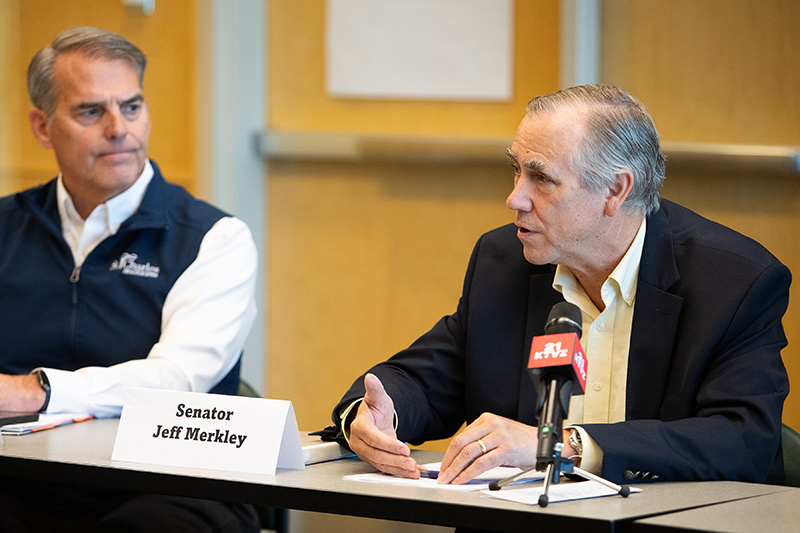Cuts could raise premiums for 12,300 local families, officials say
U.S. Sen. Jeff Merkley, D-Ore., made a stop in Bend this week to put a spotlight on President Donald Trump’s “One Big Beautiful Bill” and the impacts he says the bill will have on ordinary Americans trying to get health coverage.
Speaking at the Deschutes County Heath Services office in Bend along with local health care officials, Merkley said the bill will cause more Oregonians to lose state and federally supported health care coverage. He also warned of closures to rural health care clinics due to reduced funding.
“The big ugly betrayal decimates health care in order to help fund tax breaks for billionaires,” said Merkley, creating an alternate name for Trump’s bill. “It also runs up enormous national debt for the same reason, tax breaks for billionaires.”
Merkley said it’s “deeply troubling” that the legislation reduces the tax credits in the health insurance marketplace for American families to find health care policies. Studies show that health insurance premiums will rise 18% on average in 2026. This could lead to millions dropping their coverage.
Uninsured to increase
Earlier this month Merkley was one of 16 senators to send a letter to the Center on Health Insurance Reforms, blasting Trump’s tax and spending cuts bill, saying that the legislation will increase the number of uninsured Americans by 15 million, including seven million Americans who buy Affordable Care Act coverage on marketplaces.
“Millions more will pay higher health care costs no matter how they receive their coverage,” the letter said.
In Deschutes County, 12,300 families buy insurance through the exchanges. Merkley said these families can expect to see a $1,300 per year increase to the cost of their policies.
“This is a shock that is coming in the near future,” he said.
Merkley, whose wife is a retired nurse, said the loss of income to clinics and hospitals will also have impacts, especially in rural areas. He warned that many programs will need to be cut and some facilities are expected to shut down entirely.
Trump’s tax and spending law contains more than a $1 trillion in health care cuts, according to the Center for American Progress. Most of the cuts come from the federal and state insurance programs serving low-income Americans.
Local officials echo concerns
Holly Harris, the interim head of Deschutes County Health Services, echoed Merkley’s concerns, adding that funding cuts could impact a swath of local health issues, including lower vaccination rates and unaddressed behavioral health problems.
“We all have big concerns about what is coming in the future in terms of our ability to provide the care we are used to providing in Deschutes County and the tri-county region. The impact to access is going to be huge for people who lose their insurance,” said Harris.
Harris said an increase in communicable diseases could occur in Central Oregon due to the funding cuts and expected reduction in vaccinations. Contact tracing could also be impacted, she said. And she worries about costs associated with uninsured individuals seeking care.
“Our ability to prevent conditions from worsening is going to be impacted and the ability for service providers to absorb that work without being reimbursed for it is going to be a huge challenge,” she added.
Mark Hallett, chief clinical officer for St. Charles Health System, told Merkley the loss of funding will worsen preventative care. Important medical procedures will be delayed or deferred, he said.
“Heart attacks happening instead prevented. Strokes happening instead of prevented. Complications with diabetes and other chronic diseases,” said Hallett.
Hallett added that St. Charles is active in ending so-called “pharmacy deserts” and is worried that the goal of increasing access to pharmacies in rural areas will be disrupted by the funding cuts.
Red tape
Merkley said other provisions in the bill won’t have immediate effects but could be felt two or three years from now, after the 2026 mid-term election. He described increased red tape, including the need to reapply for the Oregon Health Plan, Oregon’s version of Medicaid, every six months, instead of the current two-year cycle.
“The intention of that is to make it hard for people. To make people continually drop off because they don’t get the paperwork completed,” Merkley said. “It also adds a lot of expenses to the state to monitor employment and monitor work requirements.”
The bill mandates work requirements for Medicaid recipients between 19 and 64 years old for them to maintain coverage. Recipients need at least 80 hours per month of work, community service or education to qualify, with exceptions for dependents and those with disabilities. Supporters say the bill targets inefficiencies in state-administered programs.
But Merkley said the bill will “trap people in poverty” because some people with medical issues may not be able to work but also won’t qualify for insurance to seek care and get better.
Around one third of Oregonians are on the Oregon Heath Plan. An estimated 150,000 to 200,000 people in Oregon will lose insurance in the process of cost cutbacks and red tape, said Merkley.
“That’s a huge impact on the quality of life of 200,000 Oregonians,” said Merkley.

